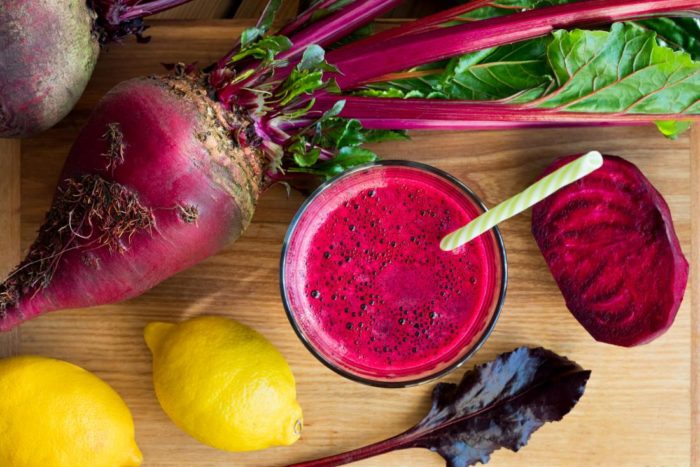What are the Vitamins and Minerals in Beetroot?
Beetroot is related to sugar beet and has a high sugar content, as high as that of an apple, in fact. It also contains potassium, calcium, sulfur and chlorine along with a moderate amount of vitamin C and folic acid. The beetroot has been recognized as being good for the blood for many years, as many an old wives’ tale confirms. There is usually some truth in them and beetroot does contain iron which is essential for red blood formation.
In Europe and Russia, beetroot is used as a tonic and to build up resistance to infection. For centuries it has been known to aid the digestive system, especially the liver. It also has a long history in the treatment of cancer as it contains ant carcinogenic substances in the red coloring matter. Beetroot increases the cellular take-up of oxygen which prevents cancer and boosts the immune system. Beetroots and their green tops are mineral rich and help to keep the gall bladder, kidneys and liver healthy. The manganese contained in the green tops helps bodily growth, maintains a healthy nervous system and strong bones and is also especially important to the metabolism and reproductive system.
How to Buy and Store Beetroot?
Don’t buy beetroots that look wrinkled, as they will be dry and tasteless. The beetroots to look for should be uncooked, firm to the touch and have smooth skins. Their green tops should be bright, vibrant and not at all droopy. Smaller beetroots tend to be tastier and juicier. They should be washed, dried and stored in the refrigerator or a cold place. Beetroot is generally available all year round.
Diet Healthy Living – Warning
Living a sedentary life without being mindful about what you eat is one of the worst things you can inflict upon yourself. If you’re not physically challenged and can go out on your way to exercise and prepare your meals, then there’s no reason you can’t adapt diet healthy living. Perhaps you’ve been slacking off lately but that’s okay. Just make sure you don’t keep on going down that slippery slope or you’ll risk having all sorts of unhealthy diseases like diabetes and cancer.
Here are some helpful tips on how to maintain diet healthy living all the time:
Eat moderate amounts of sugary foods as well as refined-grains. Yes, our body needs them but too much of anything is just disastrous. This couldn’t be truer if you’re diabetic in which case, your body can only handle so much sugar. Focus on other food groups like vegetables and fruits that are rich in protein but have low levels of sugar.
Water up. Your body consists of about 70 percent water and you need to keep that level to avoid your body organs and biochemical processes from malfunctioning. Water is like a lubricant that delivers all vitamins and minerals all throughout your body. And it is also like a cleansing agent that washes away all toxins and impurities.
Keep tabs with what you eat. Don’t go overboard. Make sure you’re within acceptable levels of calories and fats. Consult a food chart for the next few weeks until you get the hang of how to measure the amounts of nutrients that you get from every food.









